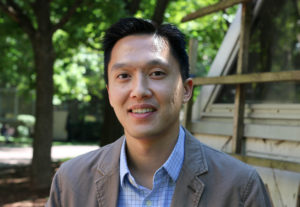 Dr. Scott Tsai is the Director of the Graduate Program in Biomedical Engineering, and a Professor in the Department of Mechanical and Industrial Engineering at Toronto Metropolitan University. His undergraduate training in Mechanical Engineering is from the University of Toronto, and his masters and PhD degrees in Engineering Sciences are from Harvard University. Dr. Tsai’s laboratory specializes in droplet and bubble microfluidics. His group also collaborates actively with hospital researchers to implement these technologies in medical applications related to lung disease and prostate cancer. Dr. Tsai is a recipient of the United States’ Fulbright Visiting Research Chair Award, Government of Ontario’s Early Career Researcher Award, and Toronto Metropolitan University’s Deans’ Teaching Award.
Dr. Scott Tsai is the Director of the Graduate Program in Biomedical Engineering, and a Professor in the Department of Mechanical and Industrial Engineering at Toronto Metropolitan University. His undergraduate training in Mechanical Engineering is from the University of Toronto, and his masters and PhD degrees in Engineering Sciences are from Harvard University. Dr. Tsai’s laboratory specializes in droplet and bubble microfluidics. His group also collaborates actively with hospital researchers to implement these technologies in medical applications related to lung disease and prostate cancer. Dr. Tsai is a recipient of the United States’ Fulbright Visiting Research Chair Award, Government of Ontario’s Early Career Researcher Award, and Toronto Metropolitan University’s Deans’ Teaching Award.
Read Scott Tsai’s Emerging Investigator article: http://xlink.rsc.org/?doi=10.1039/D3SM00380A
Find out more about his work via:
Twitter: https://twitter.com/scottshtsai
LinkedIn: https://www.linkedin.com/in/scott-tsai-2946082b/
Google Scholar: https://scholar.google.ca/citations?user=STD2oDMAAAAJ&hl=en
What aspect of your work are you most excited about at the moment and what do you find most challenging about your research?
I am excited about the prospects of utilizing nanobubbles as next-generation ultrasound imaging contrast agents and targeted drug delivery vehicles. While microbubbles have already been approved and used as contrast agents, nanobubbles, which are about a thousand times smaller, have unique advantages in a number of applications, and are only beginning to be used in applications in the last few years. One of the most challenging aspects of nanobubble research has been to make nanobubbles that have a consistent size, which we are helping to improve with microfluidics. The most challenging aspects now are to generate the nanobubbles at high concentrations microfluidically. This is difficult to do, but once achieved, enables many more impactful applications.
Can you share one piece of career-related advice or wisdom with other early career scientists?
I think it is important for early career scientists to have a mentor who is established and experienced. There are many complex issues that independent scientists need to navigate, from research funding to campus politics. Most scientists are not trained to deal with these matters, so I have found that having a mentor (who preferably is at the same institution) has been extremely helpful.










